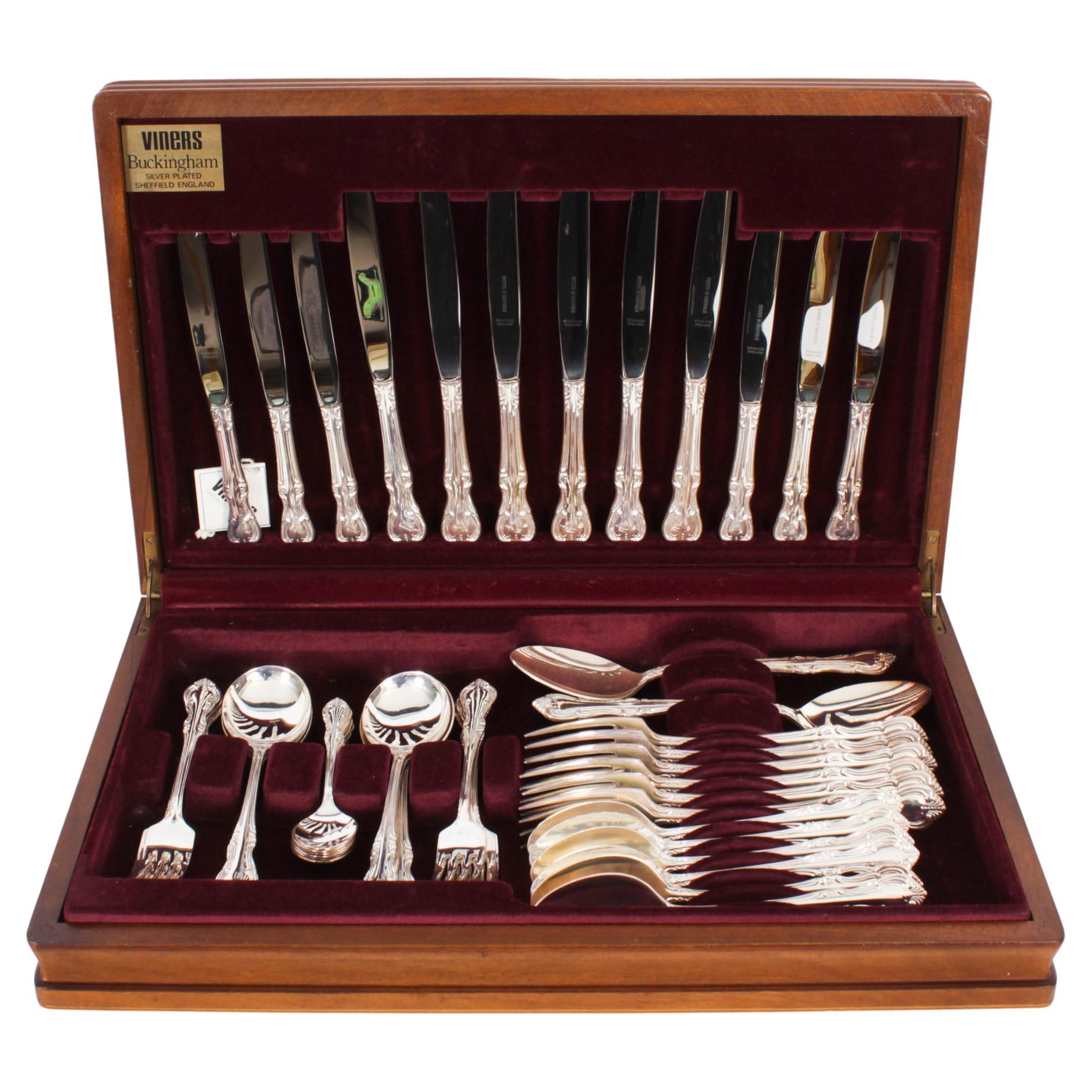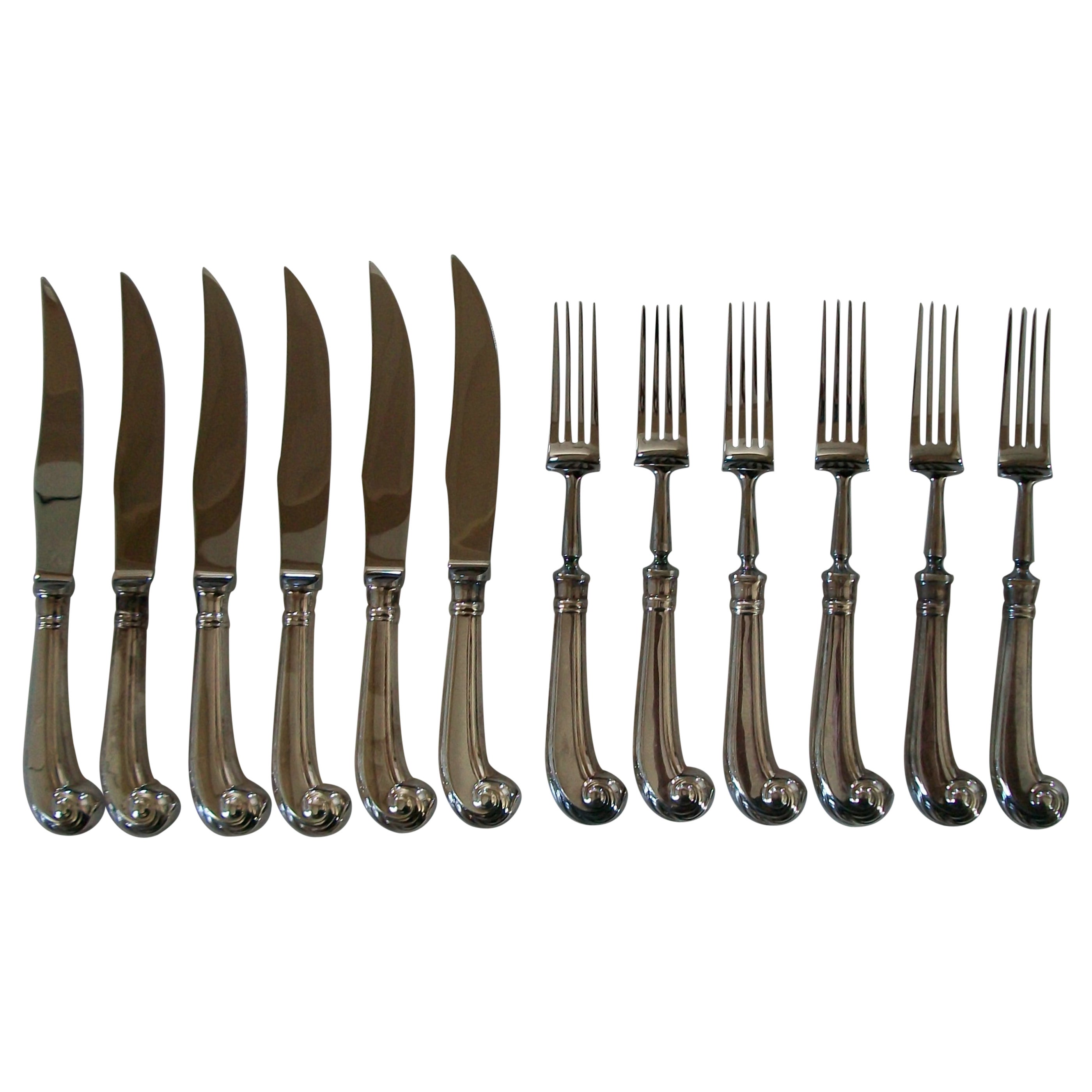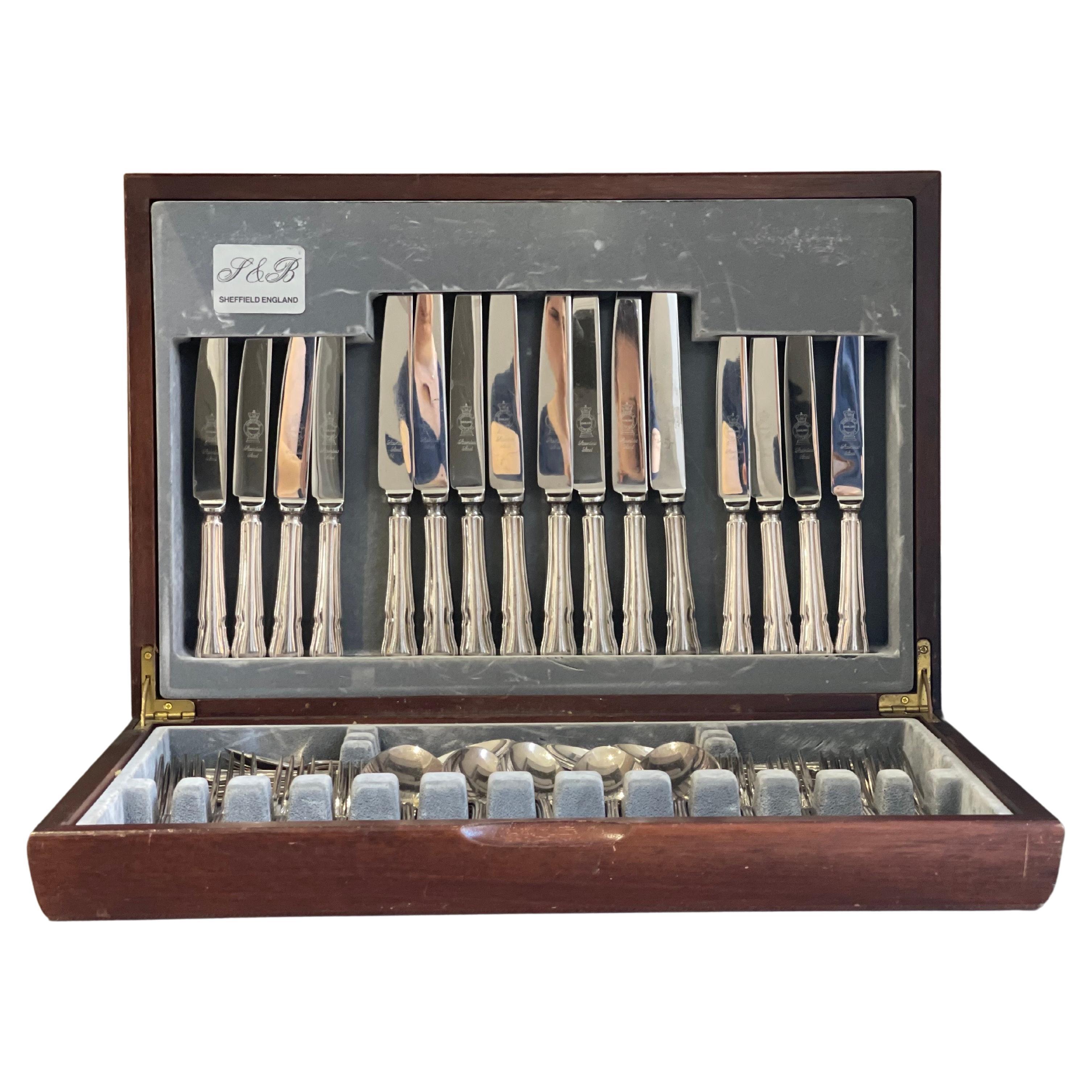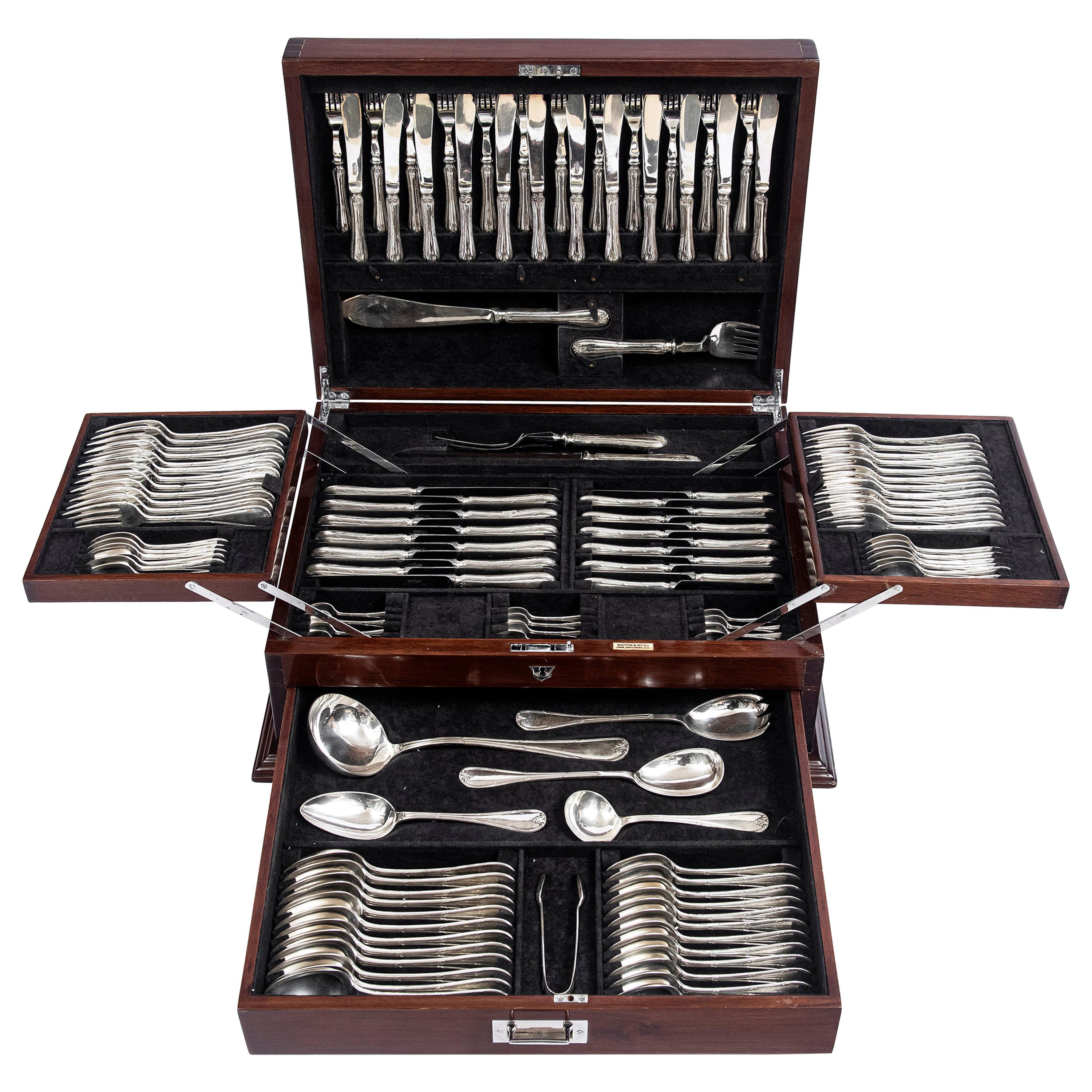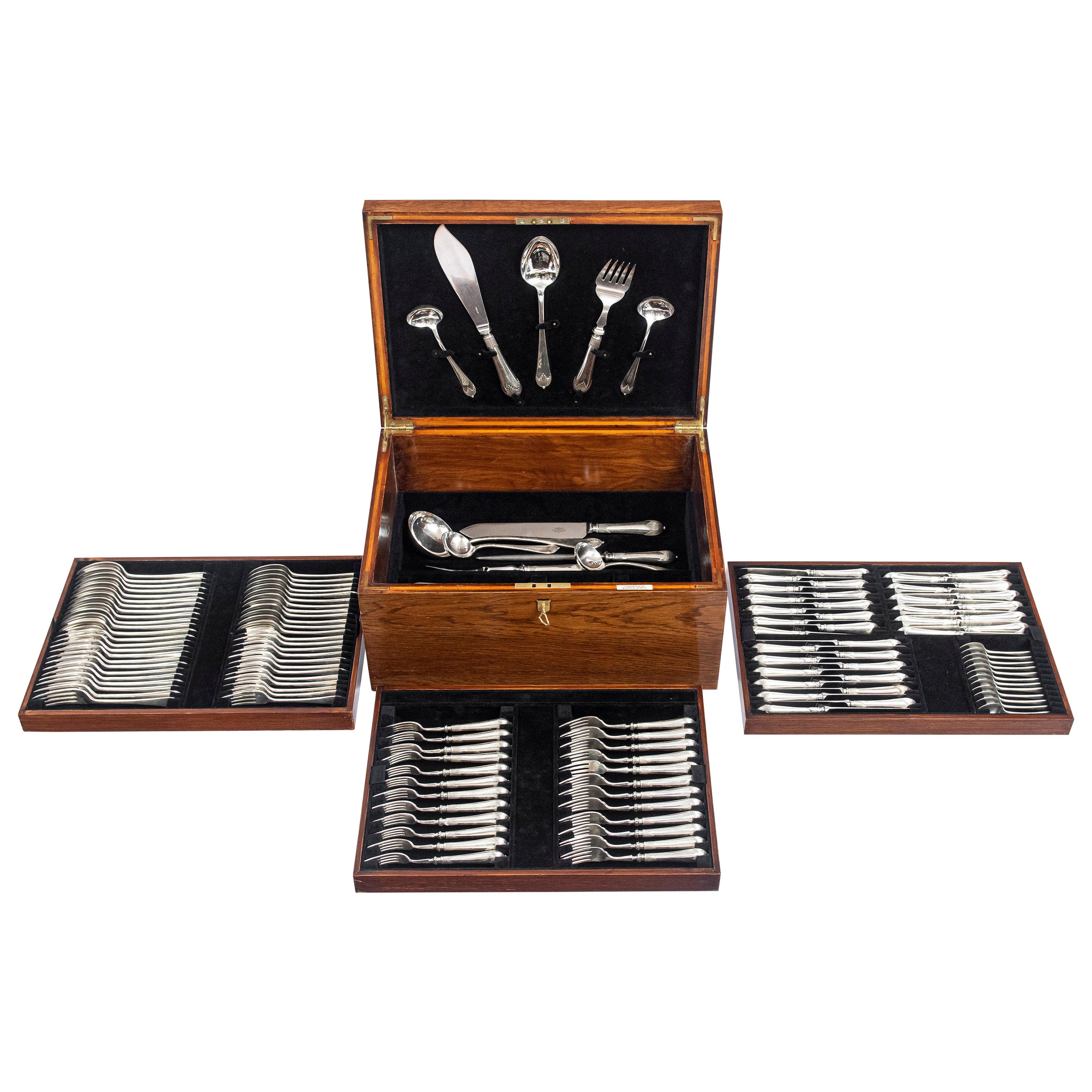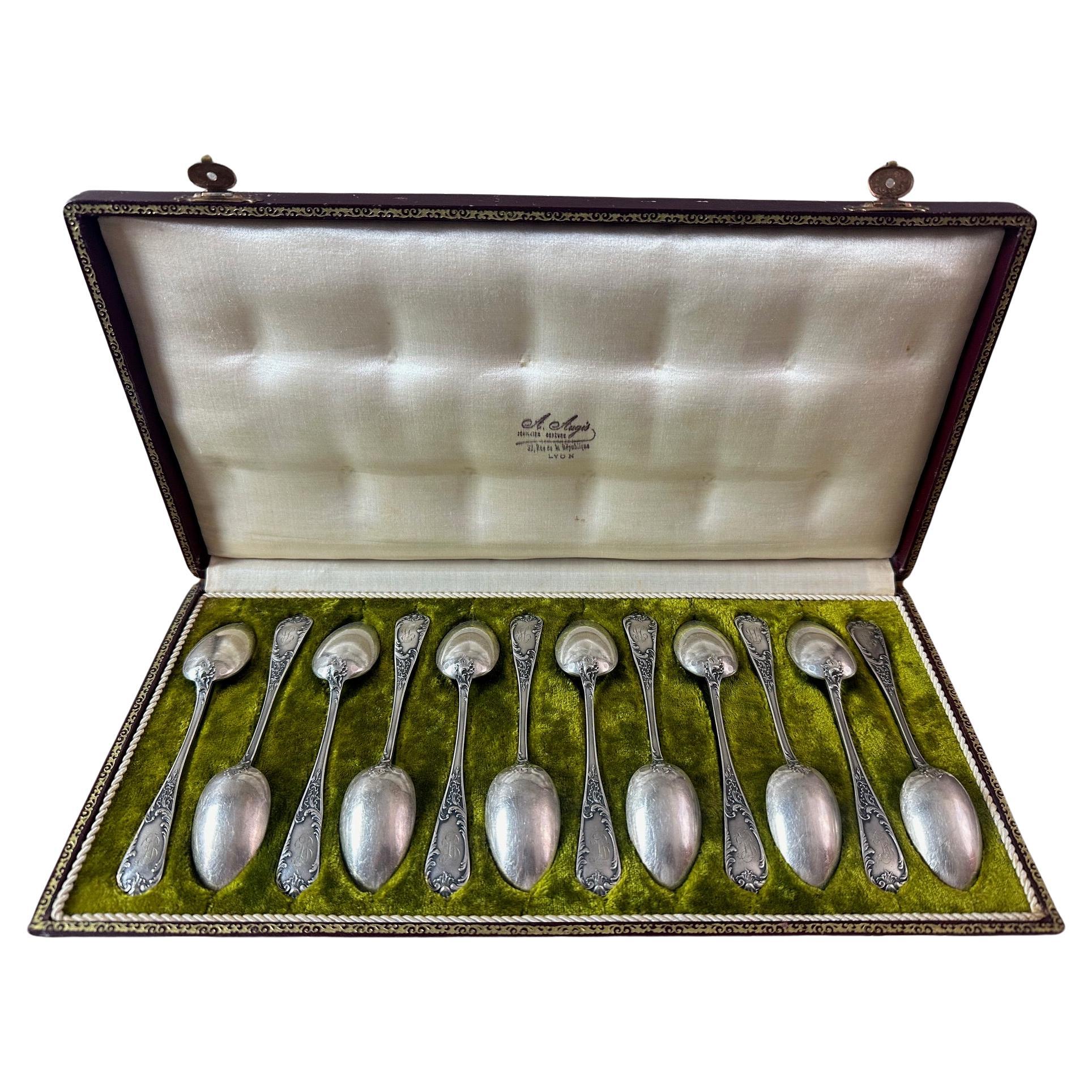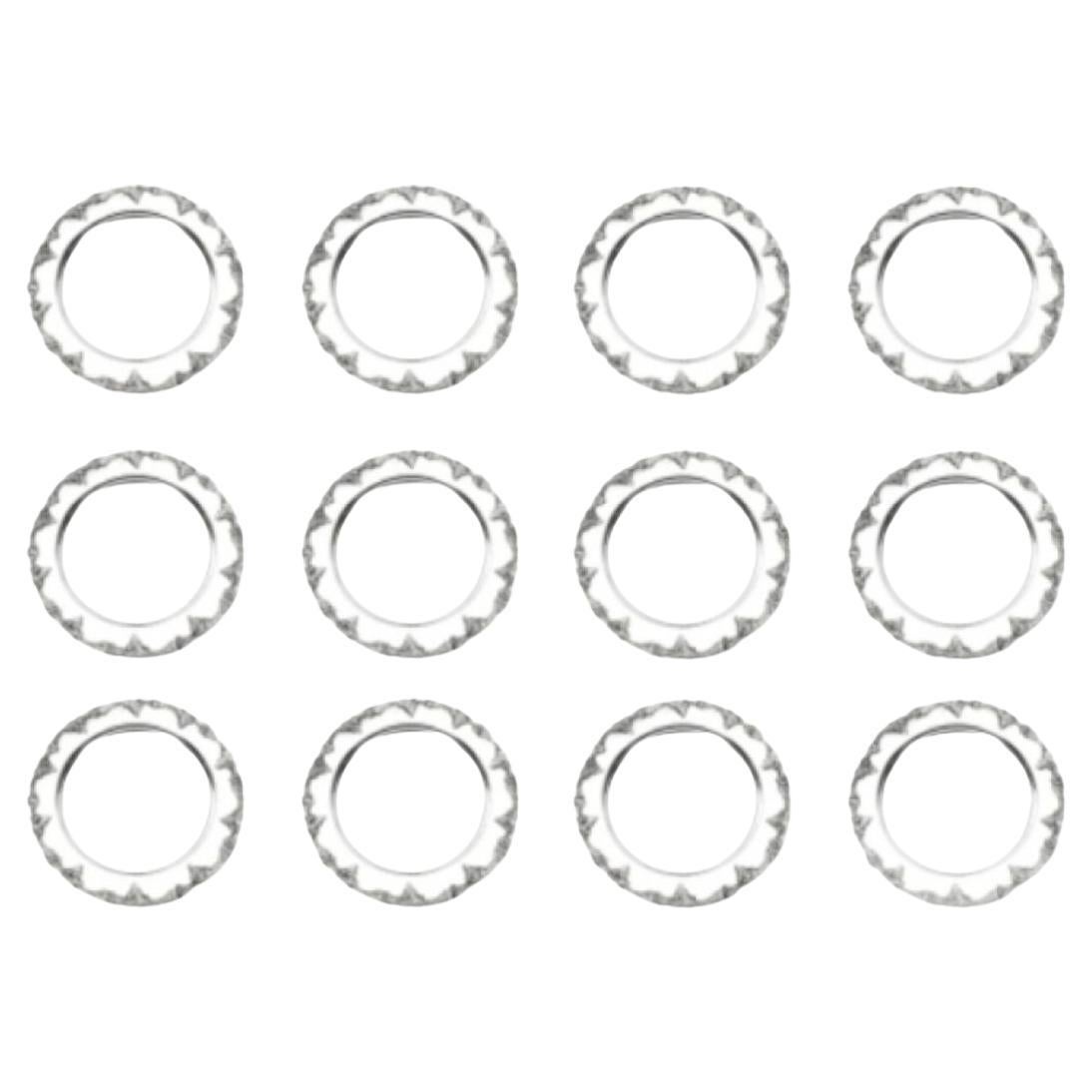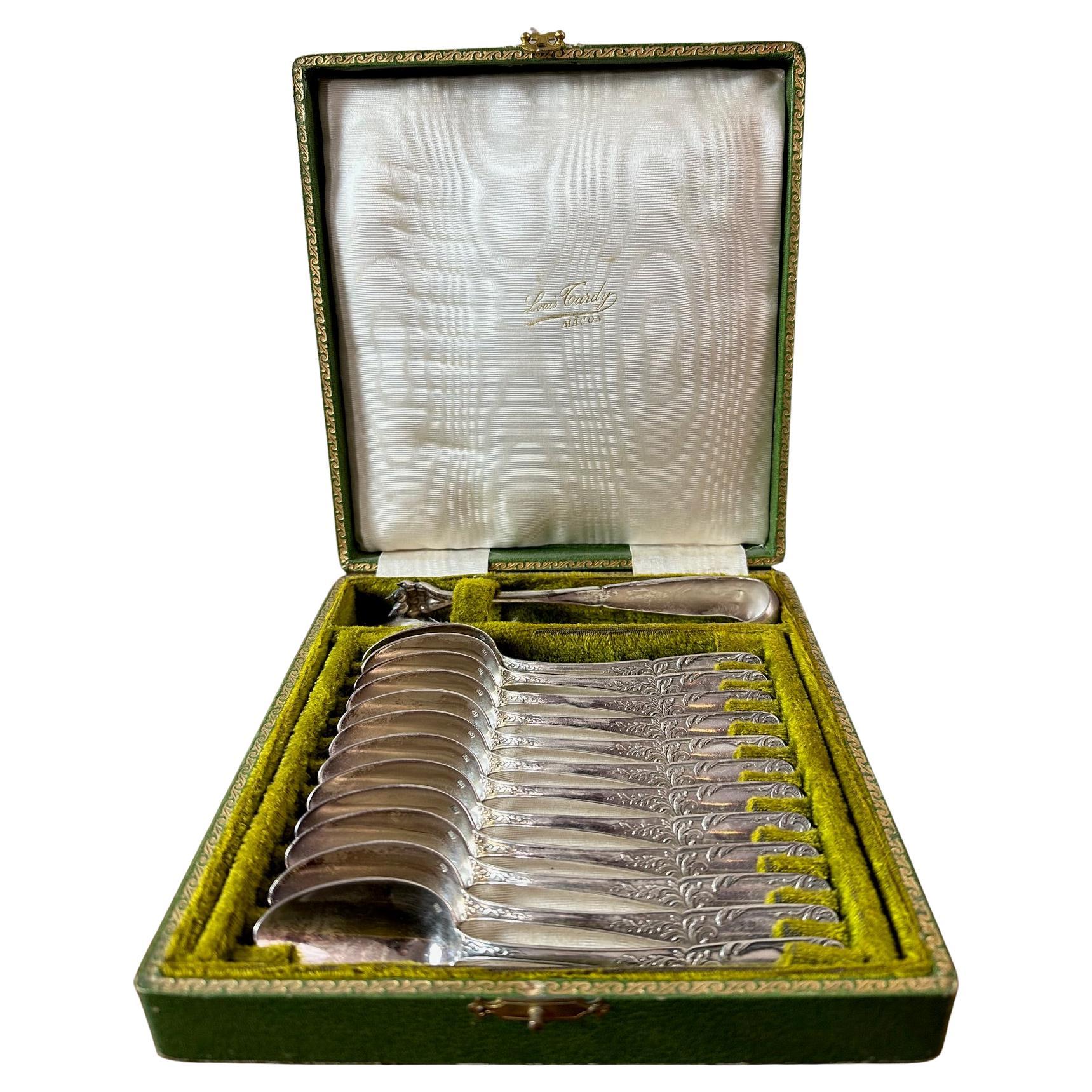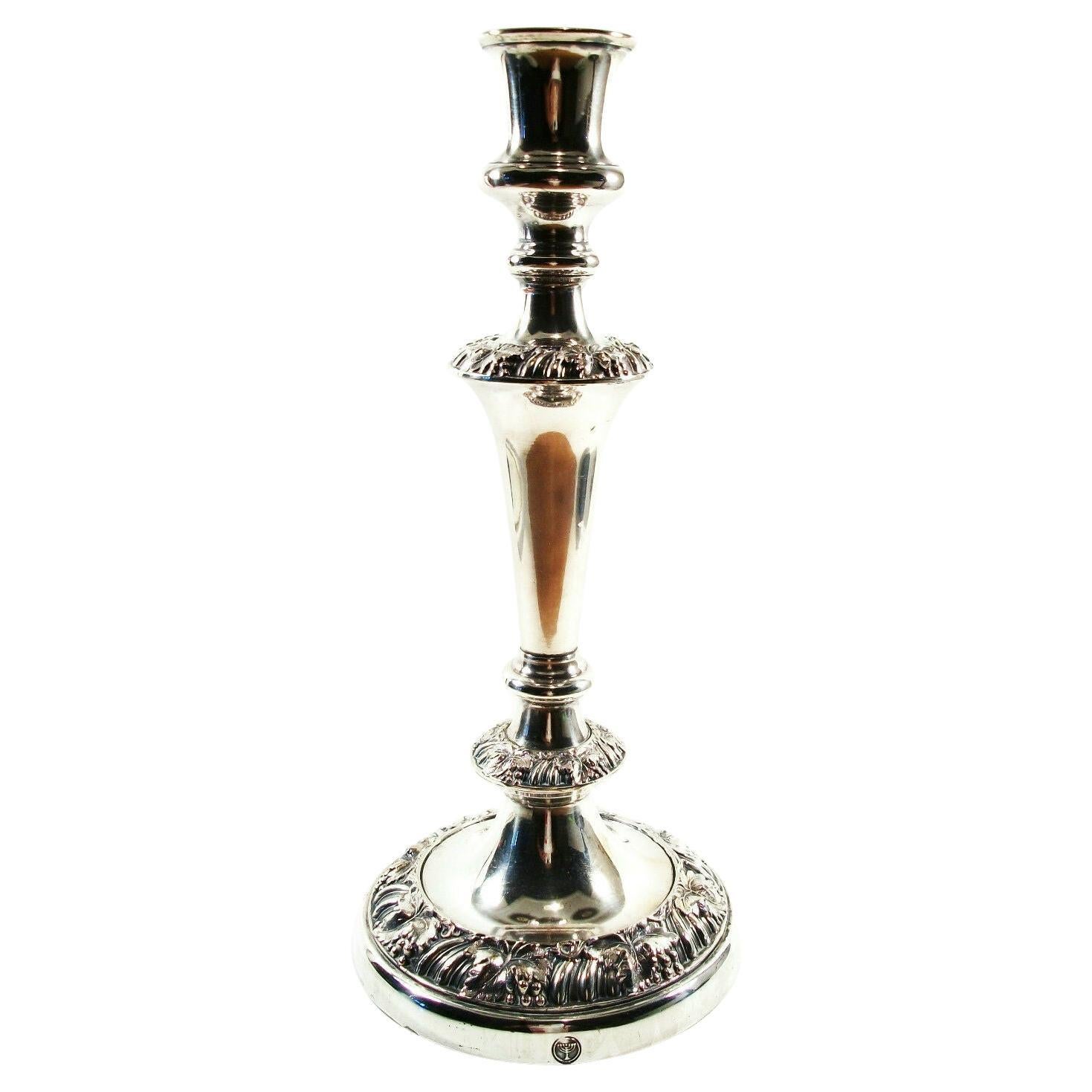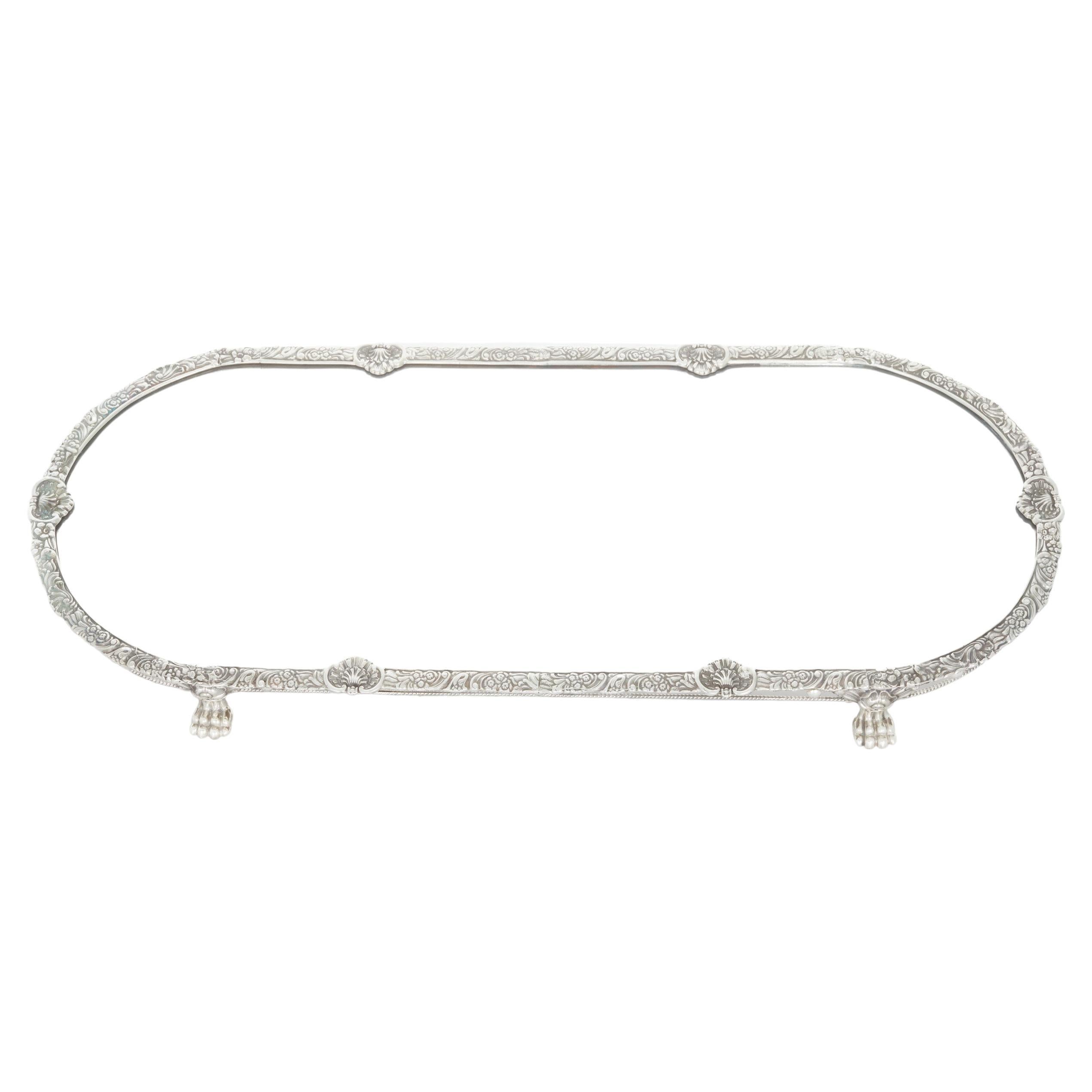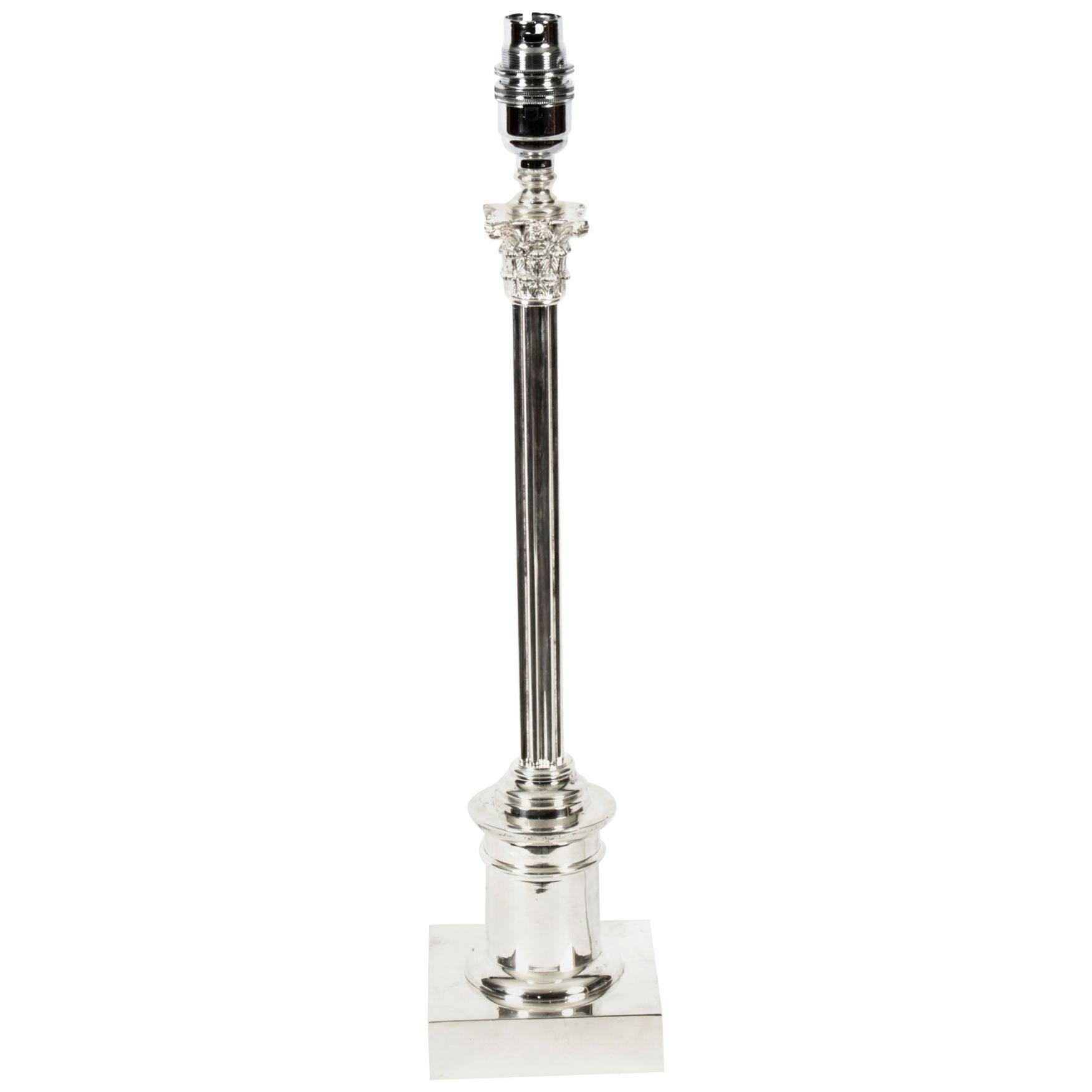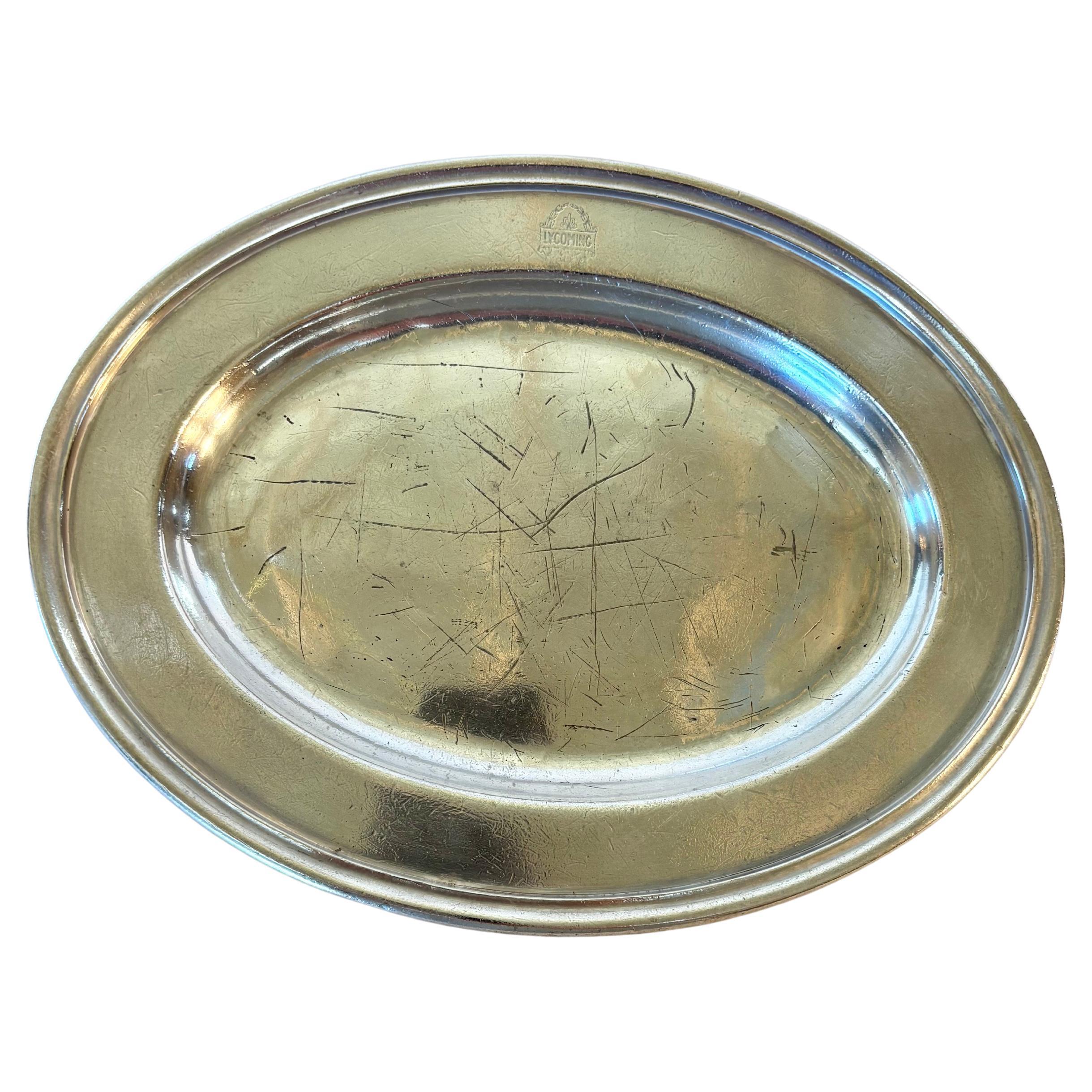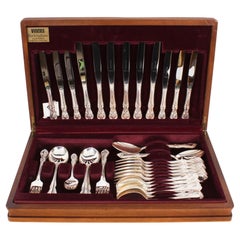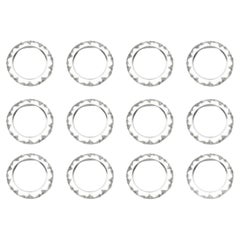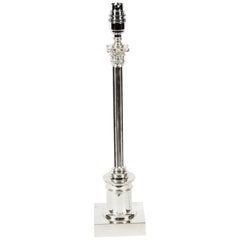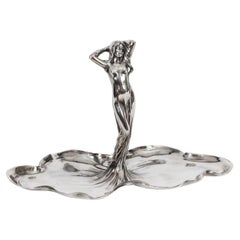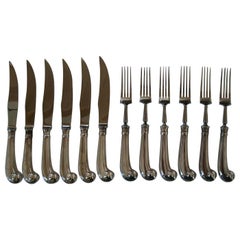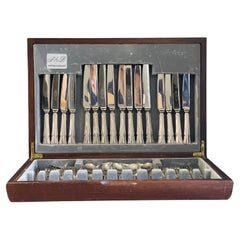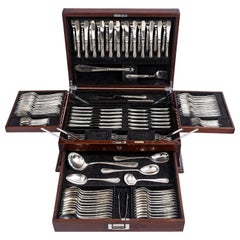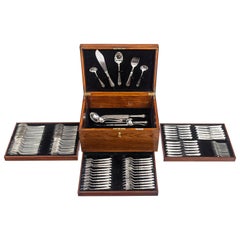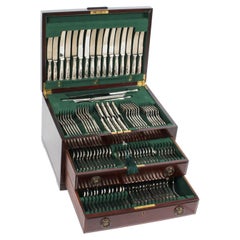
Antique Canteen x 12 Silver Plated Cutlery Set Kings Pattern Early 20th Century
View Similar Items
Want more images or videos?
Request additional images or videos from the seller
1 of 21
Antique Canteen x 12 Silver Plated Cutlery Set Kings Pattern Early 20th Century
$2,686.14List Priceper set
About the Item
- Creator:Samuel Peace (Maker)
- Dimensions:Height: 11.03 in (28 cm)Width: 18.12 in (46 cm)Length: 11.03 in (28 cm)
- Sold As:Set of 129
- Materials and Techniques:
- Place of Origin:
- Period:
- Date of Manufacture:circa 1920
- Condition:
- Seller Location:London, GB
- Reference Number:Seller: A21891stDibs: LU950625104592
About the Seller
5.0
Platinum Seller
Premium sellers with a 4.7+ rating and 24-hour response times
Established in 1983
1stDibs seller since 2012
1,386 sales on 1stDibs
Associations
LAPADA - The Association of Arts & Antiques Dealers
Authenticity Guarantee
In the unlikely event there’s an issue with an item’s authenticity, contact us within 1 year for a full refund. DetailsMoney-Back Guarantee
If your item is not as described, is damaged in transit, or does not arrive, contact us within 7 days for a full refund. Details24-Hour Cancellation
You have a 24-hour grace period in which to reconsider your purchase, with no questions asked.Vetted Professional Sellers
Our world-class sellers must adhere to strict standards for service and quality, maintaining the integrity of our listings.Price-Match Guarantee
If you find that a seller listed the same item for a lower price elsewhere, we’ll match it.Trusted Global Delivery
Our best-in-class carrier network provides specialized shipping options worldwide, including custom delivery.More From This Seller
View AllVintage Canteen x 6 Silver Plated Cutlery Set Unused 20th Century
Located in London, GB
This is a stunning vintage 6 place setting A1 Sheffield England, silver plated cutlery set by the renowned Sheffield silversmith Viners dating from the second half of the 20th centur...
Category
Late 20th Century Sheffield and Silverplate
Materials
Silver Plate
Vintage Set 12 Beautiful Silver Plated Under Plates Mid 20th Century
Located in London, GB
This is an exquisite set of twelve decorative silver plated under plates, mid 20th Century in date.
Each plate is beautifully decorated with bunches of grapes and leafy vines aroun...
Category
Mid-20th Century Sheffield and Silverplate
Materials
Silver Plate
Antique Edwardian Silver Plated Corinthian Column Table Lamp, Early 20th Century
Located in London, GB
This is an impressive antique Edwardian silver plated Corinthian column table lamp, circa 1910 in date.
It features a classic Corinthian Capital decorated with acanthus leaves and anthemion with a thin cylindrical fluted shaft on a circular pedistal raised on a square stepped base.
Add an element of pure luxury to your home with this antique silver plated table lamp.
Condition:
In excellent working condition having been beautifully cleaned and rewired, please see photos for confirmation.
Dimensions in cm:
Height 43 x width 10 x depth 10
Dimensions in inches:
Height 16.9 x width 3.9 x depth 3.9
Corinthian capital
It has been suggested that the foliage of the Greek Corinthian capital was based on the Acanthus spinosus, that of the Roman on the Acanthus mollis. The leaves are generally carved in two "ranks" or bands, like one leafy cup set within another. One of the most beautiful Corinthian capitals is that from the Tholos of Epidaurus (400 BC); it illustrates the transition between the earlier Greek capital...
Category
Vintage 1910s English Edwardian Sheffield and Silverplate
Materials
Silver Plate
Antique WMF Silver Plated Sweets / Visiting Card / Key/ Tray Early 20th Century
Located in London, GB
This is a beautiful WMF Art Nouveau silver plated visiting card tray Circa 1900 in date.
Depicting a female figure in a long, flowing diaphanous dress, the train forming the double sided tray, with the impressed maker's mark and stamped '169' to underside.
This exquisite casket could house anything from trinkets, keys, sweets to jewellery.
Whatever you choose to use this item for you are sure to do it in style.
Condition:
In excellent condition with no dings, dents or signs of repair. Please see photos for confirmation.
Dimensions in cm:
Height 22 x Width 34.5 x Depth 16.5
Dimensions in inches:
Height 9 inches x Width 1 foot, 2 inches x Depth 6 inches
WMF
In 1853, Daniel Straub, a miller from Geislingen, joined forces with the Schweizer Brothers to form the "Metallwarenfabrik Straub & Schweizer" in Geislingen.
This was the second company to be founded by Straub - previously in 1850, from the nucleus of a small repair workshop, which he had set up to work on the construction of Geislingen's famous railway incline, he had founded Maschinenfabrik Geislingen. This company was involved mainly in manufacturing mill turbines and traded throughout Europe.
As early as 1862, the young company distinguished itself by winning a gold medal at the World Exhibition in London. In 1866, following the departure of the brothers Louis and Friedrich Schweizer, the company was renamed Straub & Sohn" (Straub & Son). The company showroom, built in 1868 in Berlin, gradually evolved to become the company's first retail outlet. Three years later, the company was already employing 60 workers. By 1880, the number of employees had grown to approximately 200 and the company was already producing 960 different items.
1880 saw the merger between Straub & Sohn and "Ritter & Co.", Esslingen, to form a public limited company under the name of Wurttembergische Metallwarenfabrik. At the time of the merger, Ritter & Co.'s Esslingen factory was already using the electroplating method of silver plating and had the more modern production facilities at its disposal. Straub's company, on the other hand, was the more profitable of the two.
1892 saw the development of a special technique for silver plating cutlery, whereby the silver is distributed in a way that, at the points of the cutlery most exposed to wear and tear, the coating is twice as thick as elsewhere. This process was patented and is still in use today. Known nowadays as 'Perfect Hard Silver plating' the technique remains exclusive to WMF.
Under Carl Hugele the company gained international standing. At the turn of the century the factory in Geislingen employed 3,000 workers. By 1910, this number had already grown to 4,000, making WMF the largest company in Wurttemberg at this time. Sales catalogues were printed in twelve languages. Subsidiary companies in London, Warsaw and Vienna opened up export markets.
Under the direction of Albert Mayer the WMF studio was influenced by the art nouveau style. The product range was modernized and considerably extended. In 1905 WMF acquired a majority holding of the Cologne company Orivit AG, which manufactured products from "Orivit", a tin alloy.
As of 1925, products created by the Contemporary Decorative Products Department (NKA) made their debut on the market. This department was set up under the direction of Hugo Debach in order to establish the name of WMF amongst consumers interested in art and design. This department was responsible for producing the special "Ikora" finish, which has earned an important place in the annals of art history. The "Ikora" brand name referred to a specific method of treating the surface of the metal, by which layers of coating were applied in a partly chemical and partly heat induced process. A host of newly developed hand-finishing techniques enhanced the possibilities for adding decorative flourishes to the products. Despite being mass produced, every item looked as if it had been individually crafted.
At the end of the war the company had lost its foreign assets, associated factories...
Category
Antique Early 1900s German Art Nouveau Sheffield and Silverplate
Materials
Silver Plate
Antique Silver Plated Wine Coaster Pen Holder 20th Century
Located in London, GB
A very attractive antique silver plated wine coaster with pierced and embossed decoration, bearing the impressed makers mark JD on the base and dating from Circa 1920.
A highly vers...
Category
Early 20th Century English Sheffield and Silverplate
Materials
Silver Plate
Antique Pair Silver Plated Wine Bottle Coasters 20th Century
Located in London, GB
A superb pair of antique Regency Revival silver plated wine coasters circa 1900 in date.
They feature pierced sides embossed with fruiting vines.
The unique quality and design o...
Category
Early 20th Century English Regency Revival Sheffield and Silverplate
Materials
Silver Plate
You May Also Like
SAMUEL PEACE - Pistol Grip Silver Plate Knives & Forks - UK - Early 20th Century
By Samuel Peace
Located in Chatham, ON
SAMUEL PEACE - Antique set of fine quality pistol grip knives and forks - featuring silver plate handles with acanthus leaf scroll details and stainless steel blades (with serrated e...
Category
Early 20th Century English Georgian Sheffield and Silverplate
Materials
Silver Plate, Stainless Steel
$5,180 Sale Price / set
30% Off
60 Piece Vintage English Silver Plated Cased Kings Pattern Cutlery Set X8
Located in Wembley, GB
A Rare Cased Set of 60 antique valuable silver-plated Spoons. An elegant English Sheffield silverplated Kings Pattern 8 individuals setting canteen of cutlery, 60 pieces, mid 20th c...
Category
Vintage 1940s British Art Deco Sheffield and Silverplate
Materials
Gold Plate, Silver, Sterling Silver, Silver Plate
$1,564 Sale Price
20% Off
Free Shipping
Mappin & Webb Cutlery Set for 12 People. England, Early 20th Century
By Mappin & Webb
Located in Buenos Aires, Buenos Aires
Mappin & Webb silver plate cutlery set for 12 people, England, early 20th century.
Complete for 12 people.
A total of 130 pieces:
12 large knifes,...
Category
Early 20th Century English Neoclassical Sheffield and Silverplate
Materials
Silver Plate
$10,400 Sale Price / set
20% Off
Mappin & Webb Cutlery Set for 12 People, England, Early 20th Century
By Mappin & Webb
Located in Buenos Aires, Buenos Aires
Mappin & Webb silver plate cutlery set for 12 people. England, early 20th century.
A total of 151 pieces:
12 large knifes, 12 large forks and 12...
Category
Early 20th Century English Art Deco Sheffield and Silverplate
Materials
Silver Plate
Early 20th century French set of 12 Silver Plated Spoon, 1900s
Located in LEGNY, FR
Box of 12 small silver-plated spoons dating from the beginning of the 20th century.
Monogram on each handle "FP". Very beautiful foliage decoration.
Box stamped from the Lyonnais res...
Category
Antique Early 1900s French Sheffield and Silverplate
Materials
Silver Plate
Early 20th century French Silver Plated Set of 12 Spoon and one Clamp
Located in LEGNY, FR
Very nice box composed of twelve silver plate small spoons and a clamp dating from the beginning of the 20th century.
Beautiful foliage decoration. On the handle of the spoon we can ...
Category
Early 20th Century French Sheffield and Silverplate
Materials
Silver Plate
Recently Viewed
View AllMore Ways To Browse
Canteen Sets
Cutlery Silver Plated 12
Sheffield Cutlery Set
Sheffield Fish Set
Antique Sheffield Cutlery
Sheffield Silver Plated Cutlery
Silver Fish Slice
Sheffield England Silver Serving Spoon
Kings Pattern Silver
Silver Canteen 12
Silver Plate Antique Fish Knives And Forks
Antique Fish Slice
Cheese Slicer
Scottish Stag
Sheffield Silver Tea Spoons
Antique Silver Fish Slice
Antique Trade Knife
Sheffield Fish Knife And Fork
